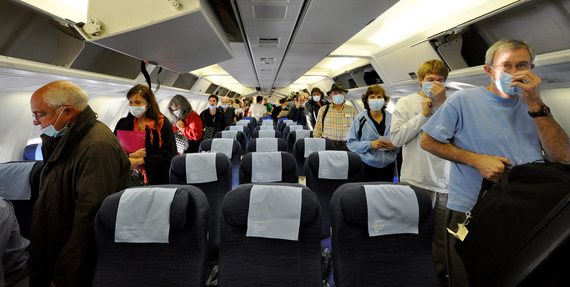By: Jeremy Glass

Credit: Flickr/Roger Schultz
After our favorite airline captain/therapist extraordinaire Tom Bunn was nice enough to tell us everything we wanted to know about flying, we came back to the man to further our fear of flying and inquire about ways people could die on airplanes that aren’t crashing.
Turns out there are a few. Hoooraaaaay.
More: The Most Underrated Tourist Attraction in All 50 States

Credit: Flickr/Michael Coghlan
Lethal blood clots
When you’re sitting for hours in the same cramped position, it’s pretty easy to get deadly blood clots, called Deep Vein Thrombosis (DVT). Since your veins rely on your leg muscles to push it back to your heart, your blood doesn’t move much and can clot really easily.
“Usually, but not always, a clot will cause pain, signaling the need for medical attention,” says Captain Bunn. This can be prevented by simply getting up and walking around during long flights and simply raising and lowering your heels while keeping your toes on the floor.
Dr. Bunn continues, “One study shows that frequent fliers are 3.65 times more likely to develop DVT than non-fliers. A non-profit DVT organization at www.airhealth.org reports that three to five percent of air travelers will develop clots. Yet, it is unclear how big a role flying plays in causing these clots. Whether in the air or in a car, it is good to take a break, stand, and stretch every couple of hours.” Also, try to avoid the window seat.
Smoke inhalation
A plane is a sealed metal box with giant engines that burn a ton of fuel, so smoke is a legitimate concern.
According to Captain Bunn, “In most accidents, smoke, not impact, is the problem. In case of a smoky evacuation, count the seat backs to find your way to the exit. If you fly a lot, invest in a smoke mask that guarantees breathable air even in smoky conditions.”
One particularly terrible accident, a freak fire in the bathroom of Air Canada Flight 797, forced the officials to update safety requirements by adding smoke detectors in the lavatories after over half the passengers died from inhaling fumes.

Credit: Flickr/David Woo
Severe dehydration
A plane is a hotbed for dehydration–the extremely dry canned air, the booze, and the altitude don’t help much.
“The humidity is so low that you lose water through your skin and when you breathe,” says Bunn. Try to avoid coffee, soda, juice, tea, and alcohol–but feel free to try to sneak on pot, because it’s not that hard. Drink water. Okay sure, it’s more of an issue if you’re the pilot, but it’s still important to stay hydrated.
To find out 2 more dangers of flying, head over to Supercompressor.com!
More from Supercompressor:
18 Camping Tips and Tricks for Survival (and Fun)
The World’s 16 Most Beautiful Abandoned Cities
Like Supercompressor on Facebook: www.facebook.com/Supercompressor
